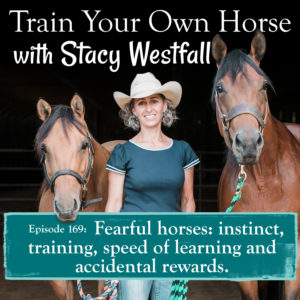Episode 169: Fearful horses: instinct, training, speed of learning and accidental rewards.

Today, I’m answering two questions about fearful horses.
I’ll discuss the dance I see between the natural flight instinct, training, a horse’s speed of learning and accidental rewards. Sometimes the idea of flight, fight, or freeze can leave us thinking that horses are limited. What makes some horse more reactive? What role does the riders’ response to the situation play in future situations? What is a 1-second spook? Here are some new ways to look at a common problem..
⬇️FULL SHOW NOTES
CLICK FULL SHOW NOTES
Links mentioned in podcast:
Article about dogs:Top tier – the brightest working dogs, who tend to learn a new command in less than five exposures and obey at least 95 percent of the time.
Sixth tier – the least effective working dogs, who may learn a new trick after more than 100 repetitions and obey around 30 percent of the time.
https://www.sciencealert.com/smartest-dog-breeds-canine-psychologist-intelligence-pets
Do you want to take the concepts that you are learning on the podcast to a deeper level? Come join me: Click here to learn more.
3 Comments
Leave a Comment
SUBSCRIBE TO THE PODCAST HERE:





YOURS FREE
WHY IS MY HORSE...?


Stacy, I have a very well trained reining horse that I have owned for almost a year. He had colic surgery 30 days after I bought him, so we had a rough start. we are now trying to get “Show ready” I am a rookie for sure but I have an amazing trainer.
ok – so my question is this. He is SUPER sensitive. He “flinches” at everything. I mean everything – including me sniffing. Somedays are worse than others.
We have treated him for ulcers and all physical things.
My trainer has kindly talked to me about it being me. I try so hard to be relaxed and positive, but I will admit, I am a bit “on guard” I am not young and I know what will happen if I come off of him. So when he flinches so do i.
I’ve never had a horse that has done this, so it’s new to me and is pushing my confidence level.
Good news is he recovers from his scare very quickly but still – 2-5 flinches a ride is exhausting.
Any tips for this situation!?!?!?!?!
Kellee- This might sound crazy and as this is a very short description, please run it by your trainer also.
When I feel *ME* being uptight, I actually do something like slap my leg loudly (this is where you need your trainers advice), tap my whip on the wall, cough loudly…basically I take control of causing a flinch from my horse.
Often if I am on edge I feel myself tighten (and as long as I’m staying safe- if I understand you correctly your not in danger, just uptight) I still do it.
There is something about being the one that triggers it that does two things.
1) I’m in control and know it is coming
2) My horse starts to ignore these ‘intentional’ startles more and more
3) I recover faster on unintentionally…which happen less because my horse thinks I’m just…weird.
Hello, I love your podcast and just listened to episode #169. Can you elaborate on mental engagement. Please provide exercises that boost the thought process and tips that will help me recognize if when and if my horse is engaged with me. He gets plenty of physical work but like the other callers, there are some seemingly random days when I can’t reach him mentally. Do you have any proven techniques to help with relaxation and connection on those soul sucking days. Thanks in advance!